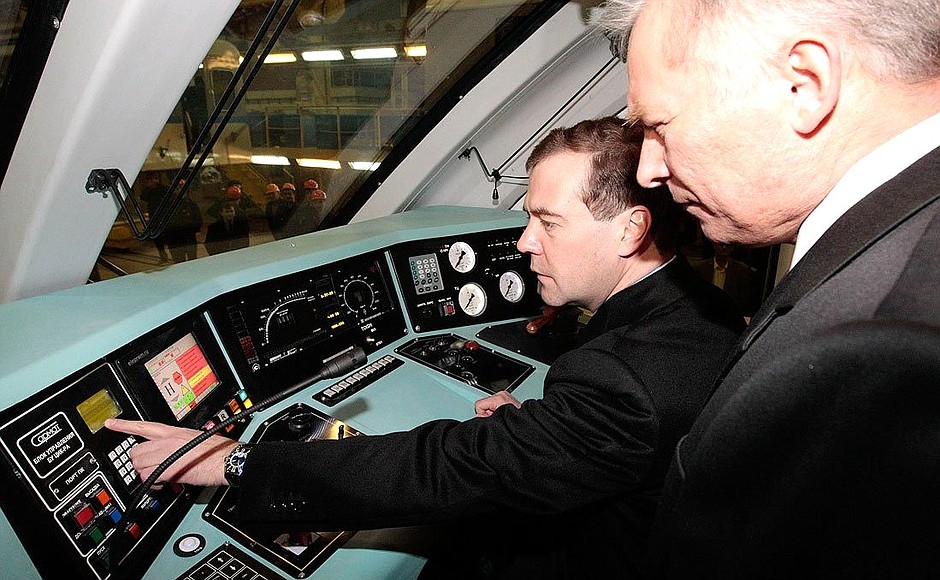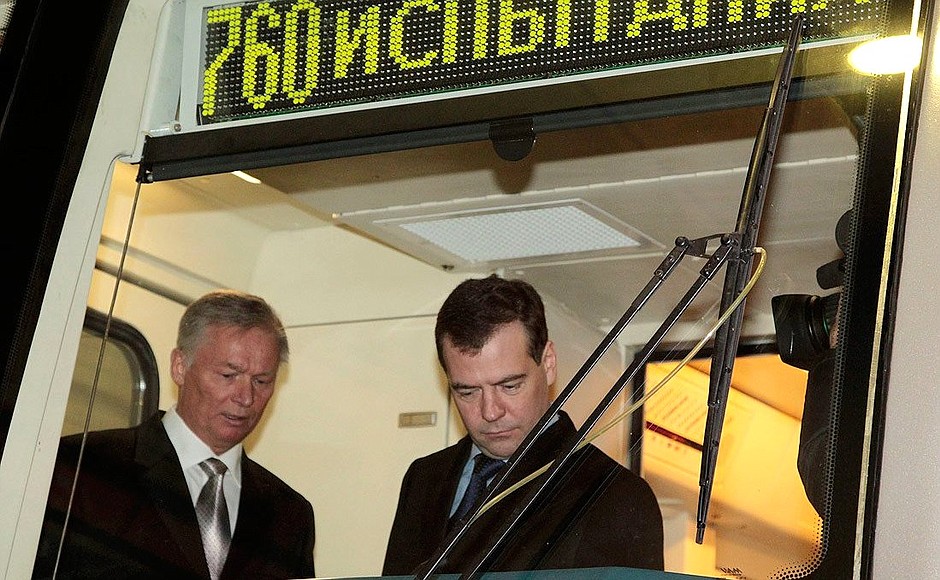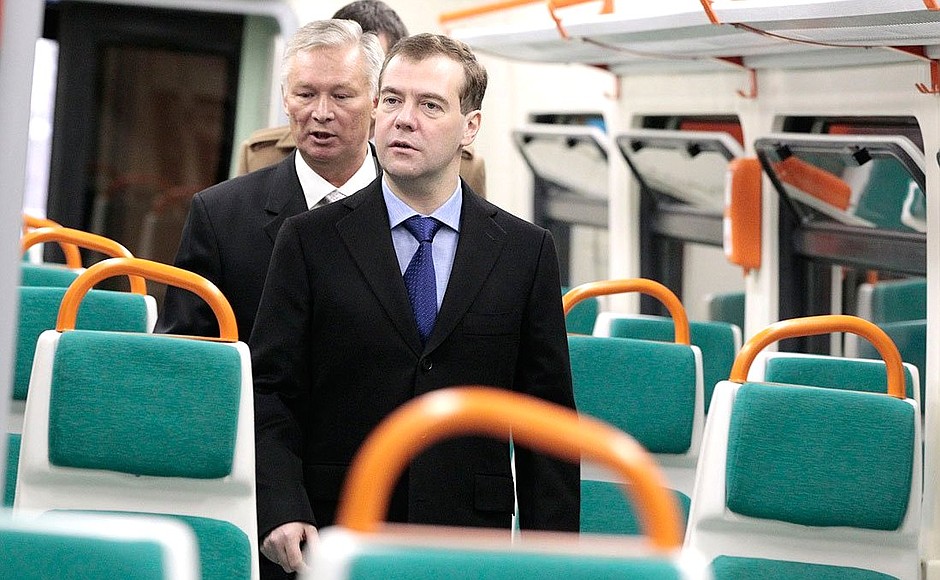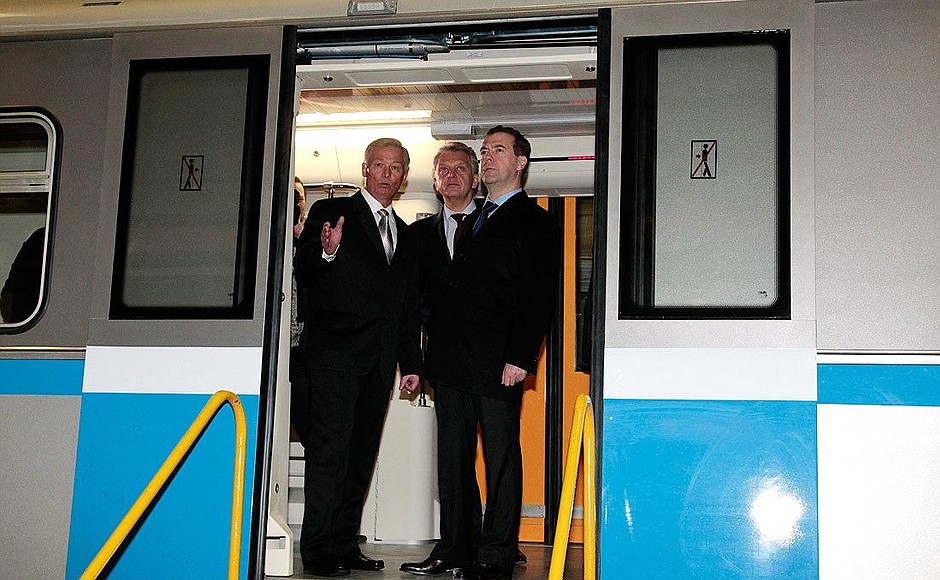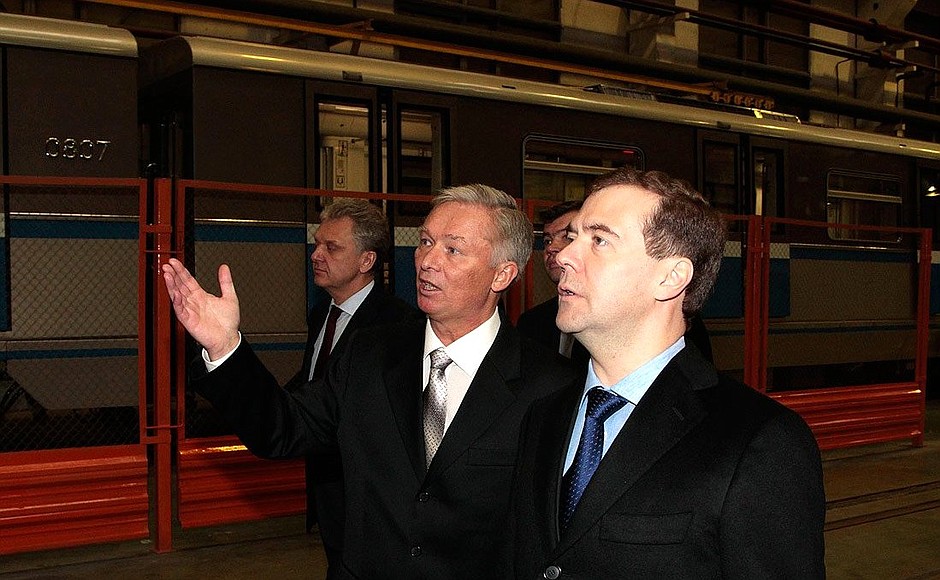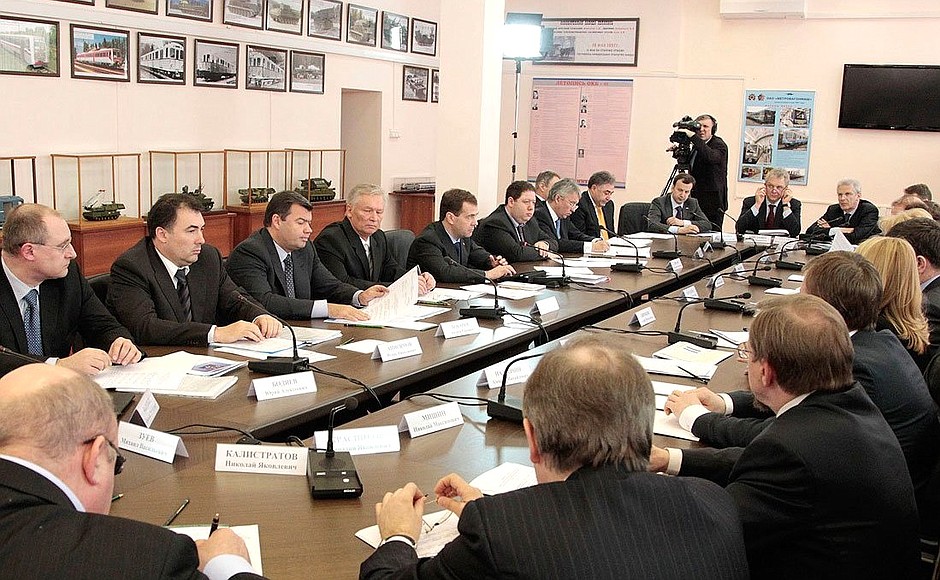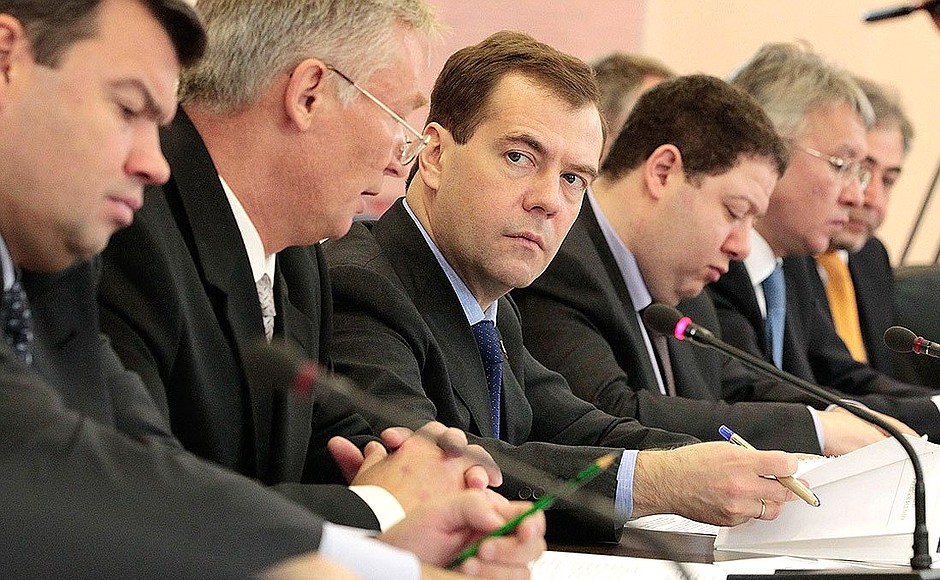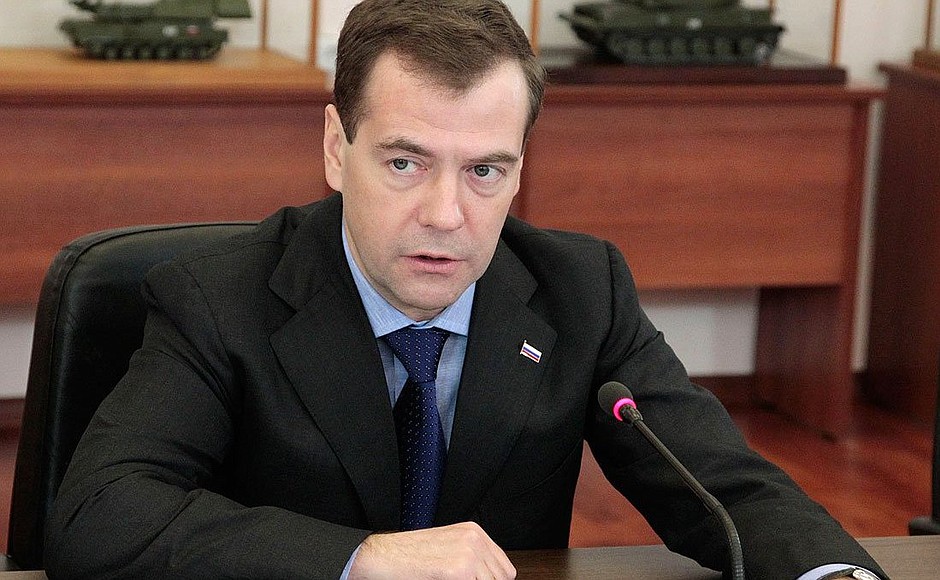Additional
The latest meeting took place at the Metrovagonmash Works in Mytishchi near Moscow. Before the meeting, Mr Medvedev took a look at the models manufactured there.
Metrovagonmash was founded in 1897 and made Russia’s first passenger electric-powered trains and subway cars. The works also established a centre for designing and testing caterpillar track chassis. Metrovagonmash is part of the Transmash Holding, one of the biggest companies on the Russian transport machine-building market. Alongside civilian goods, Metrovagonmash also designs and manufactures military products.
* * *
President of Russia Dmitry Medvedev: Good afternoon,
We are here today with the directors of different companies to discuss the issue of training engineers in our country and their subsequent employment in our industry.
I specifically chose this subject a while ago as a matter for greater attention from the authorities because you are well aware that we have problems in this area, problems in engineering education, in young engineers’ adaptation, and in the engineering profession’s prestige in general.
At the meeting in Khakassia recently I spoke with engineers from the metals and energy industries. We discussed the development of technical education in Russia, and what part the state authorities and the business community can play in this process. The engineers themselves were present at the meeting. I am sure that you, looking from the point of view of the people organising the production process, also have your own views on this issue. I imagine that many of you come from an engineering background yourselves and have your own ideas how to develop Russia’s engineering education and raise the profession’s prestige.
We are meeting today in Mytishchi, at the Metrovagonmash Works, one of the leaders in our country’s transport machine-building industry. The works will celebrate its 114th birthday this year. It is an old plant, but one that keeps abreast with the times. I hope Mr Andreyev, its CEO, will tell us about how the engineers here are working, and then others present can share their thoughts too.
Looking back over history, in the nineteenth century, for example, engineers were one of the most respected groups in our country. Our engineers were highly valued not only at home, but around the whole world. We had the chance to recall today how 135 years ago, a Russian engineer, Yablochkov, invented a new light bulb. No one was expecting this. He had no support at all from either the state or from employers, and worked entirely on his own, but what he achieved turned out to be a real revolution in energy development.
We need to decide how to develop our country’s engineering education system today. We turn out almost 200,000 engineers every year. This is a big figure, and, to be honest, I was surprised when I read it because I thought we had fewer engineering graduates these days. 200,000 engineers a year! But even so, our specialists say there is a shortage of qualified people, qualified engineers. There is big demand for professionals, a large number of jobs waiting to be filled, but at the same time, only a third of our engineers actually take up jobs in the profession they trained for, and the other two thirds vanish into other sectors. If they go into business, perhaps some good will still come out of their engineering education, but often they end up putting their diplomas at the back of some cupboard and never come back to engineering in any way or form. This is really a great pity because the engineering profession requires an immense amount of self-investment and a lot of hard work and training goes into forming engineers. This is therefore an issue that we must tackle with long-term solutions.
Our experts say also that engineering education here is still focused on the mass industrial production of 30–50 years ago. The teaching programmes, laboratory work, and research base in most universities are outdated and no longer meet the demands of modern higher education, and thus the demands of today’s companies too. We have been working together with the business community to improve university laboratories and research facilities, and it would be incorrect and not honest to say the whole picture is entirely negative in this area. But it is clear too that most universities’ teaching programmes need revision. It is also clear that most of our graduates have very little actual work experience. Furthermore, the division into masters and bachelor degrees has not yet brought about the improvement in engineering education quality that we had hoped to see.
As I understand the situation, the main cause of the problems I have just listed is the lack of effective ties between employers, companies, and the universities. Little use is being made of public-private partnerships in professional technical education. There is no clear understanding of which particular specialists we need, although I regularly ask the minister to not just make needed changes to the teaching programmes, but also ensure that the overall number of graduates our universities produce is in line with what the economy needs, and that their fields of expertise fit with real economic needs, and are not just what is trendy, popular, or for whatever reason advantageous for the universities in terms of tuition fees. Many professional standards still need to be developed, and they should serve as the base for training. We also need to draw up a ‘national qualification map’.
Your colleagues in the RSPP (Russian Union of Industrialists and Entrepreneurs) have approved around 70 professional standards so far and there are around 100 standards still in preparation. The work the RSPP and Education Ministry are carrying out also involves establishing a national qualification framework that will be used in the future.
But there are other issues that require urgent solutions: internships for students, for example, work experience in production companies and design bureaus. This is still not a compulsory part of students’ training, and so it often happens that students get into their third or fourth year of studies without ever having had any practical experience and with purely theoretical knowledge. This is no good. We all realise that we need to encourage young people to develop their creativity in scientific and technical areas and get them into work in the small businesses that the law now allows universities to establish, so that they become familiar with new technology and get some grounding in the business world, see what production is really all about, and have the chance to talk to experienced specialists and engineers.
Finally, there are the various successful examples that our big business, a number of Russian companies, has built up. They include Russian Railways, Severstal, LUKOIL, RUSAL, and others. They are financing university programmes, helping to upgrade research facilities, organising internships for students, and giving them grants. These are all good examples, although of course these are big companies and it is easier for them to do this. For instance, there are more than 33,000 students getting railways industry-related degrees at the university- and community college level programmes, and Russian Railways makes grants available for this of course.
I know that big companies are also developing corporate training centres that make use of the latest education methods, including distance learning, and module education, which is very useful for the state universities too. But here too there are some problems. For example, specialists for the defence industry are trained as a specially selected group, but the question is, how effective is this system, and what options are available, and what should be changed in the training and internship system for students.
One of the biggest issues is how to attract talented young graduates into industry and keep them there. People come into industry of course, but if they are not decently paid for their labour they leave for better opportunities elsewhere. This is a very important matter that will require separate discussion.
The final thing I wanted to mention in my opening remarks is that earlier, schoolchildren who dreamed of becoming engineers and designers would go to extracurricular technical activity groups and subscribe to all kinds of technical magazines catering to children’s various technical interests. But sadly, this has all fallen apart now. And yet there was a lot of good in these things because young people would then take up engineering studies with full awareness of their future profession’s prestige and importance. This is something we need to think about too.
Of course we cannot replicate the Soviet model, because this is in the past now, many years have gone by since then, but something similar could be tried, including the various extracurricular activity centres where children can do experiments and so on, only on a different level these days. I think this is something important not just for the state, but to a large degree for business too.
* * *
Concerning various approaches to retain professionals that our colleagues mentioned at the meeting – they are all essentially good. Clearly, the best approach is to offer good salaries, resolve housing problems, and ensure competitive conditions for a given location.
This is a provisional conversation, although much of what has been said should clearly be included in the set of instructions that I will sign following our work on engineering problems.
Overall, many people talked about how the gap between education and industry must be overcome. The only question is, how do we do it? Any means to an end. Basically, the training system itself needs to be turned upside down. We had problems even during Soviet times, and during the 1990s especially, that gap served as a barrier to preparing well-trained professionals. And the engineers that we are training, up to 200,000 people per year, have never actually gotten industrial experience. Colleagues, this is your task: to ensure that universities train the specialists that you need. No minister, not even the Government overall, will ever decide what you need. You must set these goals, and you must tell them that you don’t need this number of, say, engineering specialists, particularly non-core specialists, at higher education institutions.
I will get back to this topic, but I would like to note what our colleagues said here. Naturally, there is no need to train non-core professionals. And as far as paid education is concerned overall, those murky higher education institutions, you know my position, and I have given instructions: they need to be steadily, gradually closed. The overall number of colleges in our nation needs to be decreased, because what we have in many areas is incomprehensible. These are absolutely irresponsible institutions, providing a very weak education that discredits the very idea of a university diploma. And naturally, we need to turn toward vocational, community college-level education. But again, this is a challenge for the business, because it is the business that should develop these standards. And in my view, some of these fee-based colleges can simply be turned into community colleges or vocational high schools.
Concerning various approaches to retain professionals that our colleagues mentioned at the meeting – they are all essentially good. Clearly, the best approach is to offer good salaries, resolve housing problems, and ensure competitive conditions for a given location. But things are not that simple for everyone. Colleagues spoke about the problems they have. Nevertheless, this needs to be done; otherwise, it will be impossible to keep the professionals coming to work in your companies after they complete their college studies.
Regarding engineering centres. Naturally, I support the idea of developing them in one form or another. I feel that there is no need to close them off or assume that only Russian specialists should work there, that we should not invite people from abroad and we cannot let foreigners participate. I think that there is no need to be afraid of the depletion of personnel. Those who want to outbid for professionals will do so anyway, regardless of the barriers we create or criteria we introduce. Thus, I think that we should generally welcome foreign specialists, entrepreneurs and engineers. We used this practice in the 19th century, the 18th century and, incidentally, in early 20th century, and we shouldn’t be shy about using it now. The more people come to our nation, the better. Naturally, we also need to bring in those who are willing to work here.
<…>
Naturally, television in particular is good. We also need to make films and promote the work of engineers. But the best kind of promotion is to set good living standards.
We will discuss the engineering profession prestige once more at the Commission meeting. Again, no holds barred here, as I already said at the meeting with engineers themselves. Naturally, television in particular is good. We also need to make films and promote the work of engineers. But the best kind of promotion is to set good living standards. I gave this example in Khakassia, and I am happy to give it again. Engineers themselves should not be shy about their education. On the contrary, they should emphasise in various ways that they specifically chose engineering education, not something else. This is what you see in other nations – engineering graduates from the world’s leading universities are proud to talk about their training. Of course, this issue is a more difficult one and truly requires government attention. It’s great to make films, but we also need to implement some programmes in this area. I don’t know yet what they should be like; you should all think about what can be done about this, in addition to what is already being done at industrial facilities.
Now, let’s discuss our key weaknesses we have already mentioned here. I would like you to prepare proposals on how to change the situation before we hold our final discussion. Colleagues said that teaching staff is often trained from among the university graduates who do not have any practical experience in the field. This is bad. Here, we need to introduce some kind of criteria that can be used by universities. I understand that something is better than nothing. Of course, there are talented people who should absolutely remain at the universities. But engineering work is absolutely practical, action-oriented. It is ultimately preferable for these people to have tried something at some point in their lives. And here, we should have a constant exchange. Yes, you can go for postgraduate studies right after you graduate, but after that, it is preferable for a person to spend a few years working in business and industry. Then, let them get back to complete their PhD studies or do something else. In general, we need some mechanisms to regulate this situation.
Regarding the deterioration of physical infrastructure and informational base at specialised higher education institutions. It’s true that this is a problem, because we have pumped money first and foremost into research. Meanwhile, the training required to gain skills in engineering profession is based on the use of Soviet-era machines, mechanisms and assembly units. What can we do? In some cases, we can use state resources, but in others, I really expect that you, as industry leaders, can help out, because what’s most important is for students and graduates to be assigned or attached to a particular company, to be at that company in their last years of studies. Then, there will be no need to bring all of this equipment to the universities, since not everything can be brought there. This is particularly true given that you all have essentially unique equipment which you pay a great deal of money for, and which will never be brought to the universities. But students need to have access to this equipment, be able to touch it with their own hands to understand how to operate it.
Once again, regarding the skills and requirements that businesses must determine. The fact is, I sincerely count on you, as the heads of enterprises and companies, to present your suggestions, because the colleges will not do this, and without you, the ministries cannot do it either. We need a direct link between heads of companies and university centres; without that, it just won’t work. But naturally, this work should be led by our Education Ministry.
To conclude, I’ll say that we will continue this conversation. As a result, we should come up with a set of final suggestions on improving engineering education and the system of support for engineers in our nation.
Thank you all for your work.
<…>
